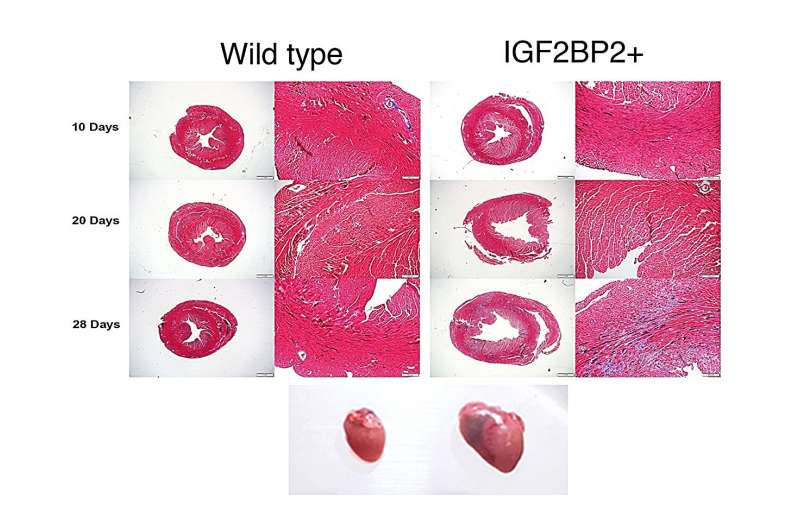This article has been reviewed according to Science X's editorial process and policies. Editors have highlighted the following attributes while ensuring the content's credibility:
fact-checked
peer-reviewed publication
trusted source
proofread
RNA binding protein IGF2BP2 identified as key player in stress-induced dilated cardiomyopathy

A new study has unveiled a discovery regarding the role of RNA binding protein IGF2BP2 in stress-induced heart conditions. Researchers from Hebrew University, Hadassah Medical Center and Martin-Luther University Halle-Wittenburg have uncovered the critical role of IGF2BP2.
The IGF2BP family of RNA binding proteins, known for their regulatory influence on intracellular RNA dynamics, has long intrigued researchers. While IGF2BP1 and 3 have been associated with oncofetal properties, IGF2BP2 stands out for its sustained expression in numerous tissues, particularly in the heart throughout adulthood.
This study focuses on IGF2BP2's response in cardiomyocytes during periods of cardiac stress and remodeling. Researchers observed an elevation in IGF2BP2 expression under stress conditions, followed by a return to baseline levels during cardiac recovery. This pattern prompted the investigation into the potential adaptive role of IGF2BP2 in managing cardiac stress.
Utilizing an inducible mouse line with enhanced IGF2BP2 expression, researchers observed an unexpected outcome: elevated IGF2BP2 expression inevitably leads to dilated cardiomyopathy (DCM) of the heart and subsequent mortality within three to four weeks in both newborns and adults. However, if transgene expression was downregulated within two weeks, a rescue effect ensued. None of the mice died, and complete recovery was observed within 12 weeks, indicating the potential for reversibility in this condition.
Further analysis of hearts exhibiting heightened IGF2BP2 levels revealed notable changes in sarcomeric and mitochondrial proteins. Specifically, these hearts displayed characteristics such as fragmented mitochondria and elongated, thinner sarcomeres, shedding light on the underlying mechanisms contributing to DCM.
Importantly, the research team also identified heightened levels of IGF2BP2 in patients diagnosed with DCM or myocardial infarction, suggesting clinical relevance and the potential for targeted therapeutic interventions.
The prevalence of DCM is a matter of debate but has been estimated to be as high as one in 250 adults. Prof. Joel Yisraeli, the principal investigator on the project, from the Institute for Medical Research-Israel–Canada at Hebrew University, said, "These findings unlock a previously undiscovered role for IGF2BP2 in stress-induced cardiomyopathy, paving the way for innovative therapeutic strategies in managing heart conditions."
The results were published, with Dr. Miriam Krumbein as lead author, in Communications Biology, as part of a collaborative effort between the Yisraeli lab in the Institute for Medical Research—Israel-Canada at the Hebrew University of Jerusalem, and Prof. Sonja Kessler of the Martin-Luther University Halle-Wittenburg.
This discovery underscores the potential of IGF2BP2 as a promising therapeutic target for various cardiomyopathies. The team's findings offer new avenues for research and potential treatment breakthroughs, heralding hope for individuals affected by heart-related ailments.
More information: Miriam Krumbein et al, RNA binding protein IGF2BP2 expression is induced by stress in the heart and mediates dilated cardiomyopathy, Communications Biology (2023). DOI: 10.1038/s42003-023-05547-x





















